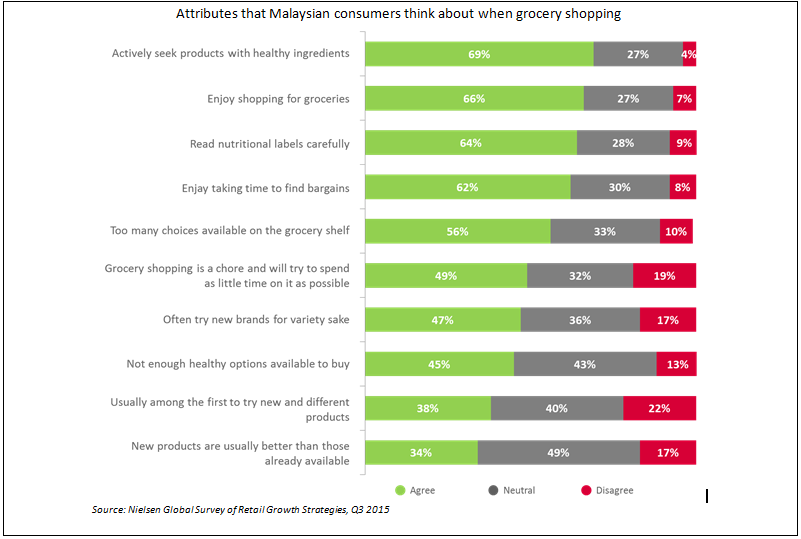Malaysian consumers enjoy hunting for a good deal
By Digital News Asia December 26, 2016
- Two-thirds of Malaysian consumers enjoy grocery-shopping
- One in two Malaysian consumers subscribe to between two and five retail loyalty programmes

PART of the fun of shopping is the thrill of the chase and three in five Malaysian consumers say they enjoy taking the time to find bargains (62%) according to Nielsen’s two latest surveys released recently on Global Retail Growth Strategies and Global Retail Loyalty Programmes.
Among the top motivators for retail shopping, at least two-thirds of respondents have indicated that they enjoy shopping for groceries (66%) and are actively seeking products with healthy ingredients (69%). Although Malaysians displayed a high propensity to engage in grocery shopping, nearly half of the respondents have also say that they will try to spend as little time on it as possible (49%).
The Nielsen Global Surveys on Retail Growth Strategies and Retail Loyalty Programmes polled more than 30,000 online respondents in 63 countries, including 551 (for Growth Strategies) and 402 (for Retail Loyalty), respectively in Malaysia to understand the pain and pleasure points about the shopping experience including what drives consumers to participate in loyalty programmes.
Fill pockets of unsatisfied demand
Despite the excitement of a good deal, about half (49%) of Malaysian respondents say grocery shopping is something they try to spend as little time as possible doing. So what is it about the shopping experience that is particularly unpleasant?
Many Malaysian consumers think retailers don’t understand and deliver on their needs. Only two in five respondents believe their main grocery retailer always or mostly communicates with them in a relevant way (40%) while nearly half believe retailers always or mostly understand their grocery requirements (46%) and provide offers they like and value (46%).
The way to stay relevant and connected to ever-changing consumer demand is to find pockets of unsatisfied demand and provide the products and services that will keep consumer satisfied and coming back time after time.
In Malaysia, the in-store services most widely available and used are convenient options that cater to the on-the-go lifestyles of many Malaysian consumers. Roughly two-thirds of respondents say they use in-store banking services (64%) and about half of the respondents indicate that they use fast food (53%), pharmacy (48%) and postal services (46%).
Other services that are less widely available or used such as cooking classes (15%) and beauty care (24%) have strong potential and about one in five respondents say they would use these services if they were available.
“Grocery shopping and mall culture has always been a mainstay for Malaysians. But modern day shoppers have moved away from the hegemony of mom-and-pop stores and fish markets to supermarkets, specialty, convenience stores and online shopping today.
“With an abundance of options at their fingertips, the retail experience must register the senses and that too in a short span of time” said Nielsen Malaysia Retailer Vertical director Manisha Kinalekar.
Price is important but it’s not everything
A core element in increasing share of wallet is understanding and responding to local consumer needs. Differentiation is the way to build a competitive advantage and it is no surprise that price is important; it always has been and always will be.
However, as smart retailers have long known, price and value is not the same thing and the Malaysian consumers are no different. In addition to seeking a convenient location (57%) and are price sensitive (54%), half of the respondents also prefer to shop at a store that sells products they want and is regularly in stock (50%) and high-quality fresh produce (50%).
“While low prices or deep promotions may initially offer consumers enough motivation to change allegiance to products, but it may not keep consumers for long if the product doesn’t deliver on its promise. Getting the price and or value equation right, having products in stock, and offering a satisfying shopping experience are vital ways to build long-lasting customer loyalty,” notes Kinalekar.
Keeping discerning Malaysian consumers loyal
Malaysian consumers are spoilt for choice when it comes to shopping as they can shop at a specialty store or mass retailers, on a computer or a mobile device. Hence, for retailers to differentiate their brand in a crowded retail landscape is not only critical but also more difficult than ever.
As such, many retailers have introduced retail loyalty programme as a mean to create a competitive advantage by reducing customers’ likelihood to switch stores.
About one in two Malaysian consumers are a member of between two and five retail loyalty programmes (53%). The global average for consumers holding two to five retail loyalty programmes is 42%.
%20that%20Malaysian%20consumers%20subscribe%20to%20versus%20Global%20consumers.png)
The survey also revealed that the majority of respondents say that financial incentives are the primary reason for participating in the loyalty programme, where at least three in five Malaysians say they value product discounts (63%) and rebates or cash back (60%) the most from loyalty programmes.

When it comes to loyalty programme features, Malaysians also say that they prefer a programme that offers flexibility. At least eight in 10 Malaysians (82%) say it is somewhat or very appealing to be able to earn rewards regardless of whether a purchase was made in store, on a website or on a mobile device.
About four in five respondents also rate three other benefits as appealing: the ability to choose among several types of rewards (79%), personalised promotions based on past purchasing (79%) and the opportunity to earn points or being rewarded for referrals (79%).
“Loyalty programmes are not new to Malaysia and shoppers tend to be well aware of the repetitive or similar promotional offerings that don’t offer unique advantages. Ideally, retailers and manufacturers need to work together to offer exclusive and personalized rewards that cut through the clutter. Making effective use of shopper data to tailor messaging and promotions that get to the heart of shopper needs, will increase store traffic and incite loyalty,” observes Kinalekar.
About the Nielsen Global Survey
The Nielsen Global Survey of Loyalty Sentiment was conducted 1-23 March 2016 while the Nielsen Global Survey of Growth Strategies was conducted 10 August-4 September2015.
Both surveys polled more than 30,000 online consumers in 63 countries throughout Asia-Pacific, Europe, Latin America, the Middle East/Africa and North America, respectively.
In Malaysia, the sample size is 402 (for Loyalty Sentiment) and 551 (for Growth Strategies). The sample includes Internet users who agreed to participate in this survey and has quotas based on age and sex for each country.




